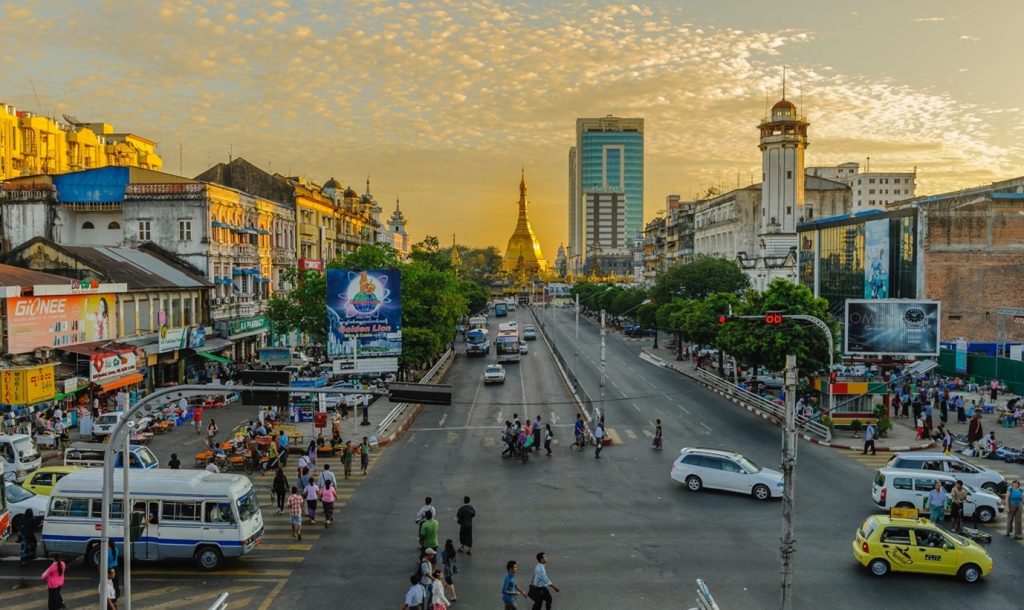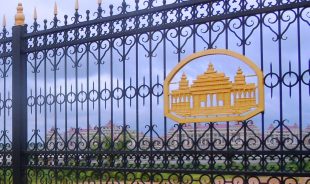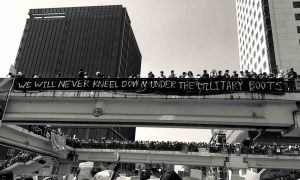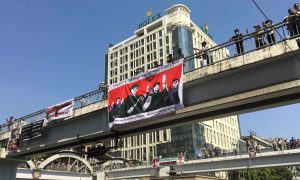Over the coming weeks, New Mandala will publish a series of interviews with academics who contributed to the 2021 ANU Myanmar Update.
This week we caught up with Hunter Marston, a PhD candidate at the ANU Coral Bell School of International Relations. We discussed his academic career and unexpected journey into the Myanmar space. Originally from the United States, Hunter Marston focuses on great power competition in Southeast Asia and political change in Myanmar.
Andre Kwok: So quick, first question. How did you become interested in Southeast Asian studies and why Myanmar?
Hunter Marston: I studied religious studies and spent a lot of time studying Buddhist philosophy and history in my undergraduate bachelor’s degree. At the time I studied abroad in India, in a Burmese monastery back in 2005. I didn’t honestly have much exposure to Burma at the time, but I think it planted a seed so to speak.
When I graduated university in 2007 – so a long time ago – that was the year of the Saffron Revolution. I didn’t have a strong interest in contemporary events or politics per se but seeing monks protest in the street for democracy and against the military at the time flipped a switch in my head. This was because I saw for the first time that Buddhist philosophy was connected to daily struggles and politics at a very fundamental level.
I was working in Vietnam at the time, teaching English and travelling in Southeast Asia. But I didn’t go to Burma until 2010 when I started working with an NGO based in Chiang Mai which had offices in Bangkok and a network of civil society activists in Myanmar. So 2010 was when I first went to Myanmar researching civil society strategies before the election that year. I worked with a variety of young leaders from across the country and met an array of inspiring people in Yangon working to steer their country’s democratic transition which was about to kick off following the November election.
I was interviewing people, and this was still very much like the old Burma people told me, you know, look over your shoulder there, military people who might follow you. I went on a tourist visa, it was very discreet, but it opened my eyes to the way civil society had to operate in the country under a great deal of surveillance. I learned a lot about the country and the politics at the time.
The following September I started my master’s degree at the University of Washington. I took a few classes with Mary Callahan, a specialist in Southeast Asian politics, who really advanced my knowledge of Myanmar and for whom I also worked as a teaching assistant for a semester. I continued to learn the Burmese language for two years while at the University of Washington. I wrote a couple research papers, including my master’s thesis, about the history of elections in Myanmar and what we could learn about the 2010 election in that context. So at that time, my academic interest in Myanmar deepened significantly.
Andre Kwok: I find it fascinating that you started from a history and philosophy background, but then you jumped into modern political contestations. During this process, could you share some of your experiences working with Burmese people?
Hunter Marston: I was fortunate because the people I met working in civil society were from all over the country. One of my good friends, whom I met during my time working with the NGO in Chiang Mai, is from Chin State, for instance. He’s someone I’ve kept in touch with closely, and his family lives in Yangon so is going through a lot with the current military coup. I met a lot of people who were working in the international development sector around the country, trying to improve the country’s technical knowledge and build communities that could engage the government and push back against things like natural resource exploitation. But you know, before 2010 and the election, it was a very difficult space to work in. Sometimes I would meet people who had worked in various ministries of the old military government for decades, some of whom took an interest in democratic values but couldn’t openly identify with the opposition.
For example, I met someone who had worked in the Ministry of Forestry who disagreed with many of the junta’s policies but had dedicated his life to trying to shape policies around natural resource conservation by serving as a bit of a bridge between the military and civil society groups. It made clear to me that things weren’t black and white in the country, there was a big grey zone, which is where people, civil society and even certain individuals within the old government were pushing back against what we tend to think of as the state being in complete control of people’s lives. Whereas in reality, there are a lot of people inside this grey zone contesting state power, trying to change things slowly.
Andre Kwok: Building on these reflections, I’m sure you had an opportunity to make unique observations while you were interning at the U.S embassy in Myanmar. Were there any particular takeaways in your role that have shaped your research today?
Hunter Marston: I’m trying to think of a simple answer: I think I gained an appreciation for how complicated democratic transition is.
That was back 2012, a year or so after the country’s multi-party parliament convened. Several ministers that I met in the Union Solidarity and Development Party (USDP) party were very sincere in their desire to see an experiment towards democracy succeed but also were very aware of the complications that democracy brings.
They were openly wondering in our conversations: democracy is so messy, what are we doing? Is this right?
In private talks with the American ambassador which I sat in on, senior Myanmar government officials would raise their concerns about elected leaders arguing in Parliament, realising that democracy was not a straightforward path. They thought maybe democracy would be simple and people wouldn’t fight, or argue. But if anything, there was more of an open debate going on, and democracy exposed deep divisions that came into play.
I also had an early glimpse into the tensions that would come as a result of the Rakhine State Rohingya crisis in 2012. At that time, the violence had already caused a lot of concern within the U.S Embassy. I think due to international media, we tend to read about the Rohingya crisis as a recent event from the years 2016 and 2017. So most people wouldn’t know that these problems date back many decades to the military regime’s targeted violence against the Rohingya in the sixties and the nineties which prompted massive refugee crises. This is a long-term problem. It’s not something that just happened in one year. Seeing those sorts of larger timelines play out was a valuable lesson.
Today’s context is obviously very different; it’s now a full-scale civil war. However, I think it was eye-opening to see how the world saw Myanmar in those pivotal transition years between dictatorship and democracy. It was also rewarding be sort of a middle person in the embassy helping American businesses trying to understand and grapple with civil society. I also got to meet more civil society leaders and community activists around the country and write diplomatic cables back to Washington, which I would not have had the opportunity to do in a bigger embassy with more staff. And as I mentioned, I had the chance to travel to Naypyidaw for meetings with senior government officials, many of whom were retired military. So that offered an invaluable lens into that government’s thinking.
We also tried to encourage dialogue between very divided religious communities in a direction that I think was positive. Obviously today, things are very negative, but I wouldn’t say that was all a failure. I think civil society and the young people in the country who have been exposed to democracy and the international community still believe in that democratic reform project and are still fighting for that dream.
Hunter Marston argues that Myanmar would benefit from a mixed member election system as it struggles to build its democracy
Myanmar could learn from Germany
Andre Kwok: I think that’s really eye-opening. I liked your thoughts on the gap between international media and people with the lived experience. Moving on from your time at the U.S embassy, what led you to pursue your PhD at the Coral Bell School?
Well first of all, I’d been reading New Mandala for a while. I’m not just saying this because I’m speaking to you. There’s a virtuous cycle here. I wrote for New Mandala, but I really never anticipated moving to Australia. After my master’s degree, I started working in a think tank in Washington or a couple of different think tanks actually. At Brookings my bosses had PhDs. I liked to read history and I wasn’t satisfied being a research assistant forever and doing event planning. I still enjoyed learning and the research, so naturally my mentors there encouraged me to go in that direction towards a PhD.
I was already in my thirties, so I wanted to do a faster PhD and not repeat masters coursework, which most American universities would have required me to do. I think ANU was an obvious choice, given it is the place with the most Southeast Asia expertise in one community and people whom I have read in the past. Then I chose the international relations department because I have a background in area studies and I wanted to move away from the sort of deep country expertise that I did in my master’s program. Instead, I wanted to draw on what I learned from travelling, living in Southeast Asia but to do more of a system-level analysis. I’m still combining my interest in certain countries like Myanmar with a broader disciplinary perspective of international relations.
Andre Kwok: Last question: What would your advice be to people studying Myanmar? Especially in the current climate without the opportunity to do fieldwork in the country
I’d say learning a language such as that of Myanmar is still valuable. You shouldn’t rule that out. At the same time, I think the current crisis makes both comparative politics and history even more important. Since you can’t interview policymakers in Myanmar today for obvious reasons, dive into the history because it’s always going to be relevant to what’s happening today. The Myanmar military consciously models its rule on past Buddhist kings. Also, other countries such as Thailand or Indonesia and other federal countries such as Afghanistan – all of these countries have lessons and parallels to Myanmar.
Having an open mind to being pulled in different directions, whether in a different discipline or towards a different country, I think will give you a unique angle to be able to say more about Myanmar. I also think being flexible about the direction your career goes in is essential. You know, I had an interest in Buddhism and India before I got interested in Myanmar. I now no longer work on Buddhism or India much. So, you see, your career will probably go through unpredictable transitions. I think it’s important to be open to those twists and turns.
 Facebook
Facebook  Twitter
Twitter  Soundcloud
Soundcloud  Youtube
Youtube  Rss
Rss 



